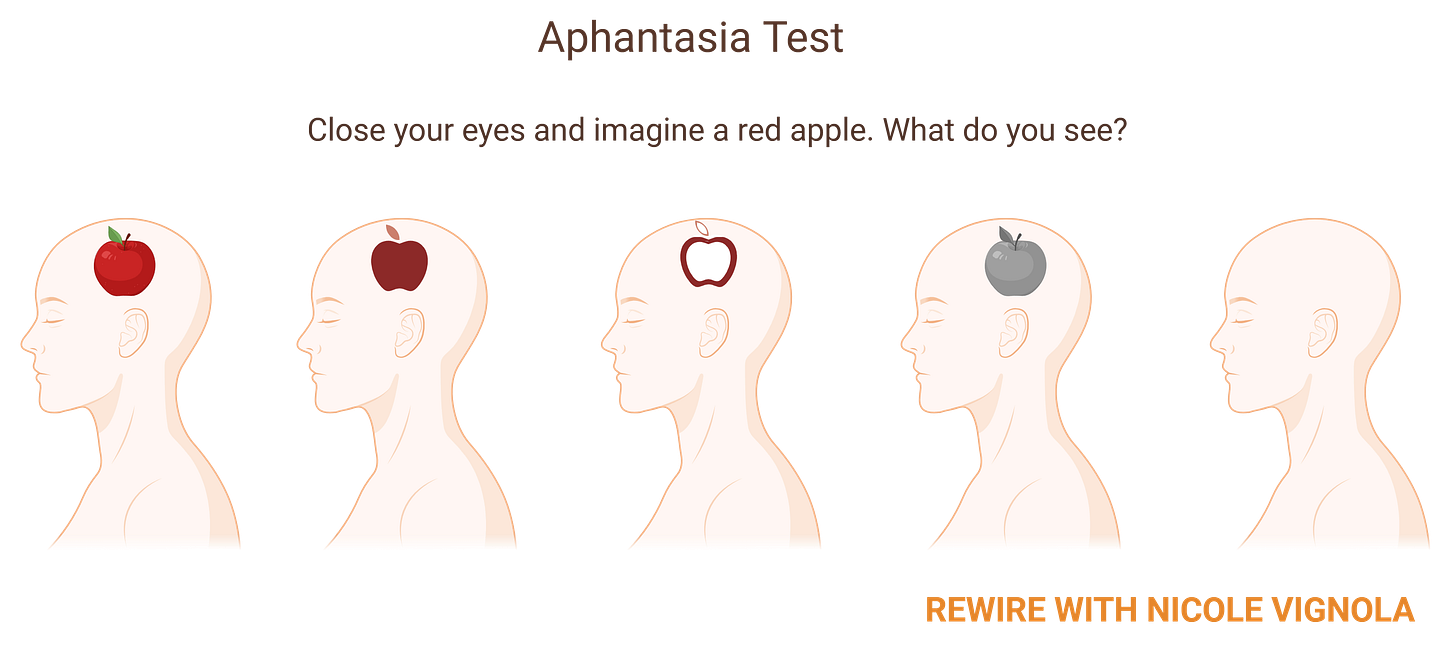Alternatives to Visualization and Journaling
For those with aphantasia, or who want to try something new!
Hey Rewire Collective,
Welcome to this week's newsletter! Let’s talk about some alternatives to the usual ‘visualisation’ and ‘journaling’ that I recommend when talking about rewiring.
Aphantasia
Aphantasia is a condition whereby someone struggles to produce mental imagery (1). Production of mental imagery is a spectrum – some people can produce extra vivid images and others can merely produce splashes of colours and outlines. In the most severe scenario – aphantasia – you cannot produce any image.
The term aphantasia was coined less than a decade ago, and so research is still new. Interestingly, it appears that imagery in dreams is retained for many people with aphantasia (2). However, the impacts of aphantasia vary greatly: some people have issues with remembering events or faces, and in some cases, there appears to be a link to autism (2). However, in other cases, it presents without a link to any other conditions. The underlying brain correlates of aphantasia are still being discovered, but it appears differences in brain connectivity may explain the symptoms (2).
There’s also different types of imagery that we must acknowledge, such as spatial imagery, and auditory imagery. In people with aphantasia, about half report a lack of imagery with other senses, including hearing (3). There are early reports that aphantasia is linked to a lower chance of PTSD – potentially due to the inability to visualize intense emotional imagery (4).
Research shows that people with aphantasia can use strategies other than visualisation to retain working memory. In fact, people with aphantasia did not perform worse on visual memory tasks, suggesting that there’s a separation between visual imagery and working memory, even with visual tasks (5). Some research suggests the parietal lobe helps to encode visual information in more abstract versions (6). There is also evidence that in some cases, visual imagery can be stored in a more categorical/linguistic form (7).
It appears that people who use visual imagery to help with visual memory tasks are more precise in completing the task, but are more vulnerable to distracting information. People who use other strategies, such as categorical, abstract, or linguistic, are less precise when completing the task but more secure to remember even with distractions present (8,9).
Alternative Strategies
If mental imagery is something you struggle with, you can try to use either language/auditory techniques or using pre-existing imagery.
Language/Auditory Techniques
If you want to stop a ruminative thought: say it out loud, question it out loud, talk through it out loud.
If you want to process an event/thought: use speech-to-text apps to record how you’re feeling and what you’re thinking. You can read it over after and see if you would change anything or if you discovered anything new.
If you’re trying to change your narrative, pick a new motto (‘I am kind’) and repeat it to yourself. Practice speaking that narrative with others.
If you’re trying to practice mindfulness: Use an auditory-guided meditation session. Focus on your breathing instead of creating a mental image.
Pre-existing imagery
If you’re struggling to plan or visualise your week/time: use a colour-coded calendar to easily identify free time, work time, and leisure time.
If you want to get better at a sport/hobby: Watch videos of others practising those activities, rather than imagining yourself doing it. While you watch, try to imitate some of those movements, or imagine what it would feel like to be them in that moment.
If you want to process something with images: Try drawing it out yourself. Or, find an image that represents how you’re feeling or what happened, and think about what you would change to personalise it.
Bonus tip: Muscle memory! Remember, our bodies are really good at remembering how we felt and moved. If you struggle getting out of bed early for a run, and cannot imagine what that looks like, then do it! When you’re going to bed, practice getting out of and into bed. Or, if you’re struggling to work through a problem, act it out! Act out your own inner narrative and then act out the change.
Until Next Week,
Nicole x
P.S. Let me know if there’s any topics you want covered in future newsletters!
References






I am 5 weeks out from a 6 week course of prednisone (to treat an emergency inflammatory condition ) . I have/am ADHD..After a 6 week roller coaster of speedy joy and energy I am exhausted find myself mindlessly scrolling motivation is challenging and the beautiful pathways I had created to manage persistent pain and ADHD seem to have disappeared. My question is what should I have done? Have my pathways gone? I had no idea this would happen.
Thank you so much, this is great! ❤️